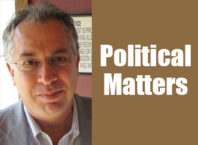I last saw Leonard Peltier on Jan. 15, 1985, at the federal prison in Springfield, Missouri. I traveled from the Twin Cities to Springfield, with photographer Dick Bancroft, for a one-hour interview with the American Indian Movement (AIM) activist.
Peltier is serving two life sentences for the murder of two FBI agents in a June 26, 1975 shootout near the village of Oglala on the Pine Ridge Indian Reservation. An Indian man also died in the firefight.
Peltier, along with Dino Butler and Bob Robideau, was charged for the murder of the FBI agents. Fearing for his life, Peltier fled to Canada, and was arrested in Alberta early in 1976. A federal jury in Cedar Rapids, Iowa acquitted Butler and Robideau on the murder charges on July 1976.
Following the acquittals of Butler and Robideau, the U.S. government focused its attention on Peltier. On April 18, 1977, a jury in Fargo, No. Dakota, found Peltier guilty of first-degree murder in the killing of the FBI agents. U.S. District Court Judge Paul Benson sentenced Peltier to two consecutive life terms.
In late August, Peltier, who has been imprisoned for more than 33 years, was denied parole. He will not be eligible for parole again for 15 years – in 2024, when he will be 79 years old.
Interviewed by Amy Goodman on her “Democracy Now!” program, Peltier’s lawyer, Eric Seitz, said the decision by the parole commission, which he described as “a holdover group of people from the Bush administration and an agency of the Justice Department,” will never parole Leonard Peltier.
“They adopted in full the position of the FBI that if you kill an FBI agent, you should spend the rest of your life in jail, even if there are serious questions about the conduct of the FBI itself and of the government in prosecuting him,” Seitz said.
Indeed, Thomas J. Harrington, an executive assistant director of the FBI, testified against parole for Peltier at the July 28 hearing in Lewisburg, Penn. Harrington’s statement was a patchwork of facts, distortions and lies, which is typical of FBI comments on the Peltier case over the past three decades.
It is the sacred mission of the FBI to make someone pay for the killing of two of its agents; and the agency, which waged a dirty counter-insurgency war on South Dakota’s Indian reservations in the 1970s, is determined to see Peltier die in prison.
In a letter to the parole commission, Amnesty International quoted U.S. Appeals Court Judge Gerald Heaney, who presided over a motion for a new trial for Peltier in 1986. In a 1991 letter to the Senate Select Committee on Indian Affairs, Judge Heaney expressed his concern that “the FBI used improper tactics in securing Peltier’s extradition from Canada and in otherwise investigating and trying the Peltier case.
Although our court decided that these actions were not grounds for reversals they are, in my view, factors that merit consideration in any petition for leniency filed.” The Amnesty International letter concluded that the “interests of justice would best be served by granting [Peltier] parole.”
Eric Seitz, in his “Democracy Now!” interview, also discussed some of the egregious government misconduct in the Peltier case. He suggested future litigation to pry loose additional government documents, but told Goodman that the “more fruitful” approach “is going to be an effort to try to get clemency for Leonard, in terms of his advanced age, in consideration of his health, and because of the fact that this just simply is a case that needs to be brought to resolution properly.”
At the end of August, I talked on the phone with Michael Kuzma, a lawyer in Buffalo, N.Y., who has worked on the Peltier case for the past eight years; he has filed “hundreds” of Freedom of Information Act (FOIA) requests, in an effort to retrieve government documents that have been withheld. Kuzma said that the recent parole hearing was a “train wreck waiting to happen.” Instead of going for the parole hearing, Kuzma advised that it would have been better to work discreetly for presidential clemency, through contacts sympathetic to Peltier in the Obama administration.
Presidents typically consider appeals for clemency – pardons and commutations – at Christmas and at their end of their term in office. Kuzma allowed that a presidential commutation was a “long shot”; but the recent parole denial was a “disaster,” and makes a bid for presidential clemency more difficult.
For updates in the Peltier case, go to: whoisleonardpeltier.info.




